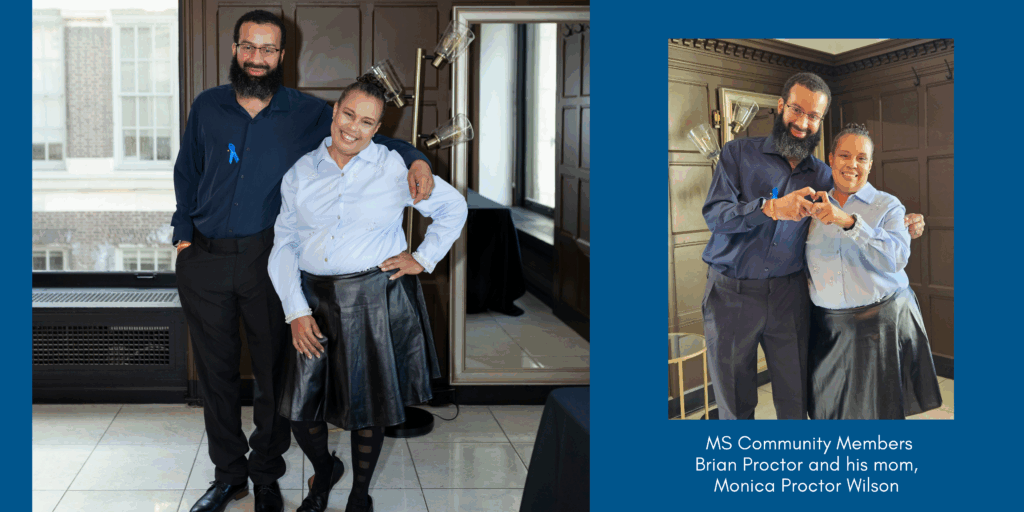We often talk about the “summer slide” when the heat wipes us out, but winter is just as complicated for our community. Some of us are celebrating the drop in temperatures, while others are dreading the daily pain. It really shows how different MS can be for everyone. We are all just trying to figure out how to handle the thermostat without losing our minds.
Continue readingTag Archives: MS symptoms
Ask the Expert: Depression
Featuring Barry A. Hendin, MD
MSAA’s Chief Medical Officer
Barry Hendin, MD
Question: What should care partners do if they suspect depression in their loved one with MS, and what are the treatment options?
Answer: Like other medical illnesses, depression is often a shared experience between the person experiencing it and their care partner. It’s helpful to be an empathetic listener and supporter, rather than believing that it’s up to you to fix it.
Continue readingHighlighting the MS Community This Holiday Season and Always
As we approach the season of giving, the Multiple Sclerosis Association of America (MSAA) would like to bring special attention to the many wonderful community members that we serve. With our mission of Improving Lives Today, MSAA genuinely strives to advocate for and prioritize the well-being of all individuals who have been affected by multiple sclerosis. Over the years, we have collaborated with so many inspiring people, and we are honored to be able to highlight their stories.
In the spirit of the holiday season, we would like to share the heartfelt story of mother and son, Monica and Brian, who both live with multiple sclerosis.

“I’ve learned that in any situation, if you are not advocating for yourself, you’re not going to get anything. My name is Monica Proctor Wilson, and I was diagnosed with multiple sclerosis on my 40th birthday after spending several years seeking answers to my symptoms. For four or five years, doctors kept saying that it was fatigue, and that I was overworked and needed to take a break. I believed it was multiple sclerosis, and I started asking about it. People would ask me, ‘Why would you want MS?’ I did not want MS. I just wanted to know what was going on with me,” Monica shared.
Continue readingWhen MS Makes It Hard to See: Understanding and Coping with Vision Changes
Dealing with changes to your vision due to multiple sclerosis (MS) can be one of the scariest and most stressful things you face. It’s a core sense we rely on every minute, and any trouble with it can feel overwhelming. If you’re struggling, please know you are absolutely not alone. Your challenges are valid. As one forum member shared, dealing with vision issues can truly “mess with your head.”
Continue readingTrying Your Best to Catch Some ZZ’s
Sleep…. This word can generate a mixture of feelings for many. Some people find it so easy to just lay their head down, turn off the inside chatter of their mind for a bit, and fall into a good snooze. But for others, sleep is a tease- a taunting pleasure just out of reach, and for various reasons. For those living with MS, it’s very common fatigue symptom can be in constant conflict with sleep. Those who need to rest but find they can’t, or getting sleep at unwanted/inconvenient times, etc. We know that sleep is extremely important for our minds and bodies, but it’s not always easy to attain.
Continue readingAsk the Expert: Anxiety
Featuring Barry A. Hendin, MD
MSAA’s Chief Medical Officer
Barry Hendin, MD
Question: What are the symptoms of anxiety, and how does anxiety differ from depression?
Answer: It is common for people with and without MS to experience anxiety from time to time. Anxiety can be helpful in fact, alerting us to dangers around us or focusing our attention on stressors. Anxiety, however, can become more problematic when it’s severe, pervasive, and persistent. Then it becomes a disorder: generalized anxiety disorder. At that point, it distracts from our quality of life.
Continue readingCreative Thinking & Well-Being
By Stacie Prada
Being creative is generally accepted as a desirable trait, and the science supports it helps our well-being. When we look at our health physically, it’s often using objective measurements, lab test results, and diagnostic imaging. They provide numerical measurements and data to compare ourselves to a healthy range for most people.
To capture emotional well-being, we use more subjective measurements that consider mood, worry, stress, happiness, and level of confidence we feel about managing our health.
Continue readingMaking the Most of Life After an MS Diagnosis
By Dr. Eva Jackson
Reflections on Life After Diagnosis
Over the past several years, I have had the privilege of hearing MS Warriors share their personal experiences following their diagnosis of multiple sclerosis. Their stories offer a unique perspective on how disease has influenced their lives.
For some individuals, the initial impact of MS was minimal, allowing them to maintain their routines and activities without significant disruption. However, for others—particularly those diagnosed during more advanced stages, the effects were much more profound and immediate, altering their daily lives in meaningful ways.
Despite these varying experiences, there is a shared understanding among all of us: the importance of making the most out of life while we can. This common outlook serves as a powerful reminder to cherish each moment and embrace opportunities for fulfillment, regardless of the challenges we face.
Continue readingNavigating Bladder and Bowel Dysfunction: A Community Perspective
Living with multiple sclerosis (MS) can be full of surprises. One of the toughest challenges for many people is dealing with bladder and bowel issues. These are things we don’t always feel comfortable talking about, but they’re a very real part of the disease.
This article, which brings together stories and advice from people who are living with MS, is here to help you feel less alone and more in control. It’s all about sharing what we’ve learned to manage these often-secret symptoms.
Continue readingBeyond the Usual: An Inside Look at Weird MS Symptoms
Beyond the Usual: An Inside Look at Weird MS Symptoms
While many are familiar with common multiple sclerosis (MS) symptoms like fatigue, vision problems, and muscle weakness, the reality for those living with the condition often involves a bizarre and sometimes baffling array of odd manifestations.
These “weird” symptoms can be unsettling, isolating, and even comical at times, highlighting the unpredictable nature of MS.
MultipleSclerosis.net asked its community members: “Have you ever experienced what you thought was a ‘weird’ symptom and wondered if others with MS have experienced it too?” Here’s what folks had to say:
Continue reading

